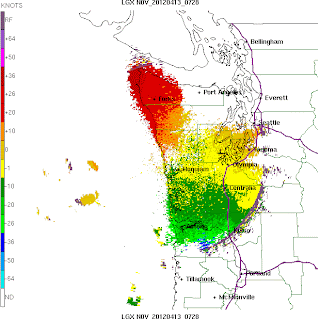Well, we have our new coastal radar and I was wondering how the birds look from a coastal perspective and particularly whether our feathered friends like to fly offshore. Lets get some answers!
Here is the composite radar image a little after sunset, when there was still plenty of light in the sky (8:33 PM, Thursday). A few echos, with a lot of ground clutter around the radar (radar beam hitting the surface).
An hour later...even more birds. Interestingly the birds don't seem to fly very far offshore (the few isolated echos you see over the Pacific are some light showers). Perhaps someone can tell us why.
Still doubt they are birds? Well, we can check the direction of motion using the Doppler radar capabilities of our radar, telling us the speed of the "targets" towards or away from the radar. Green indicates flow towards the radar and red away...and the velocities are quite substantial (up to around 30 kts). The color indicates that these objects are moving northward..what we would expect from spring migration. The birds had a tailwind last night (literally!) since there was southerly flow in the lower atmosphere.
These bird echoes disappeared around sunrise....something that is clearly not meteorological.
The sun is long set tonight (Friday) and here is the latest radar image from Langley. Same deal...lots of birds. Note the appendage sticking out near Grays Harbor...that is sea clutter....the radar beam is hitting the ocean surface and reflected back to the radar. There was some worry that our new radar might have a more serious sea clutter problem, but as you see it is a minor issue.
Tonight the winds are from the north aloft and the Doppler velocities are weaker but still indicate targets that are moving north (see image), but at a slower speed. The reason: tonight our feathered friends have a head wind slowing their progress!
If only birds could interpret weather radar imagery....
 |
| Preparing for tonight's migration |






No comments:
Post a Comment